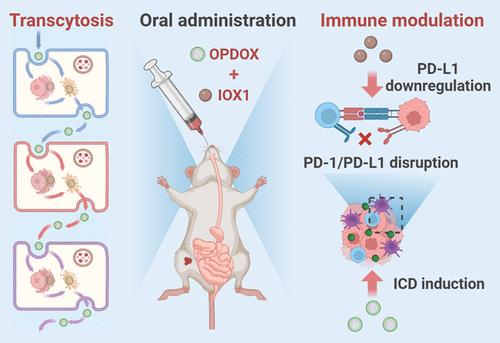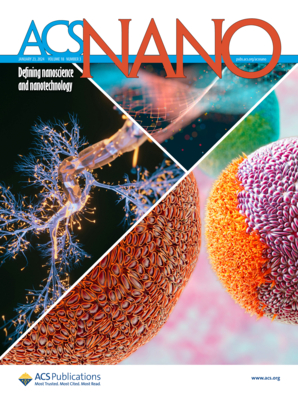Synergistic Combination of Oral Transcytotic Nanomedicine and Histone Demethylase Inhibitor for Enhanced Cancer Chemoimmunotherapy
IF 15.8
1区 材料科学
Q1 CHEMISTRY, MULTIDISCIPLINARY
引用次数: 0
Abstract
Oral nanomedicines present a preferable avenue for cancer immunotherapy, but their efficacy is limited by gastrointestinal absorption challenges, tumor physiopathologic barriers, and immune evasion mechanisms. Here, we present an approach that combines an oral transcytotic doxorubicin (DOX) nanomedicine with the histone demethylase inhibitor 5-carboxy-8-hydroxyquinoline (IOX1), thereby enabling synergistic chemoimmunotherapy. We demonstrate that IOX1 significantly augments the transcytosis capabilities of DOX-loaded poly(2-(N-oxide-N,N-diethylamino)ethylmethacrylate)-poly(ε-caprolactone) micelles (OPDOX), promoting their transcellular transport across various cellular barriers (villus, endothelial, and tumor cells), thus improving oral adsorption, vascular extravasation, and tumor penetration. Furthermore, IOX1 sensitizes chemotherapy to potentiate DOX-induced immunogenic cell death and downregulates programmed cell death-ligand 1 to disrupt the immune checkpoint mechanism, synergistically boosting robust antitumor immune responses. Consequently, orally administered OPDOX in combination with IOX1 efficiently inhibits CT26 tumor growth, highlighting the significant potential for enhancing the efficacy of oral nanomedicines in cancer chemoimmunotherapy.

口服转细胞纳米药物与组蛋白去甲基酶抑制剂协同联合用于增强癌症化学免疫治疗
口服纳米药物是癌症免疫治疗的首选途径,但其疗效受到胃肠道吸收挑战、肿瘤生理病理障碍和免疫逃避机制的限制。在这里,我们提出了一种将口服转细胞阿霉素(DOX)纳米药物与组蛋白去甲基化酶抑制剂5-羧基-8-羟基喹啉(IOX1)相结合的方法,从而实现协同化学免疫治疗。我们证明IOX1显著增强了dox负载的聚(2-(n -氧化物- n, n -二乙基氨基)甲基丙烯酸乙酯-聚(ε-己内酯)胶束(OPDOX)的胞吞能力,促进其跨细胞运输跨越各种细胞屏障(绒毛、内皮细胞和肿瘤细胞),从而改善口腔吸附、血管外渗和肿瘤渗透。此外,IOX1使化疗增敏以增强dox诱导的免疫原性细胞死亡,并下调程序性细胞死亡配体1以破坏免疫检查点机制,协同增强强大的抗肿瘤免疫反应。因此,口服OPDOX联合IOX1有效抑制CT26肿瘤生长,突出了增强口服纳米药物在癌症化学免疫治疗中的疗效的巨大潜力。
本文章由计算机程序翻译,如有差异,请以英文原文为准。
求助全文
约1分钟内获得全文
求助全文
来源期刊

ACS Nano
工程技术-材料科学:综合
CiteScore
26.00
自引率
4.10%
发文量
1627
审稿时长
1.7 months
期刊介绍:
ACS Nano, published monthly, serves as an international forum for comprehensive articles on nanoscience and nanotechnology research at the intersections of chemistry, biology, materials science, physics, and engineering. The journal fosters communication among scientists in these communities, facilitating collaboration, new research opportunities, and advancements through discoveries. ACS Nano covers synthesis, assembly, characterization, theory, and simulation of nanostructures, nanobiotechnology, nanofabrication, methods and tools for nanoscience and nanotechnology, and self- and directed-assembly. Alongside original research articles, it offers thorough reviews, perspectives on cutting-edge research, and discussions envisioning the future of nanoscience and nanotechnology.
 求助内容:
求助内容: 应助结果提醒方式:
应助结果提醒方式:


